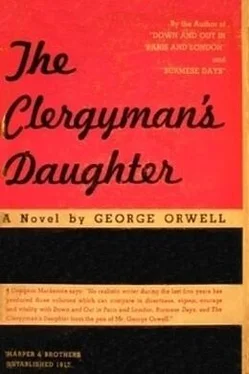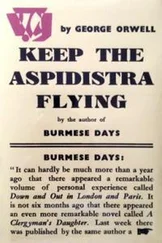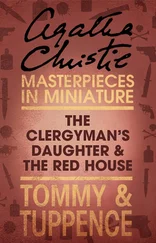'Things change in your mind,' she repeated. 'I've lost my faith,' she added, somewhat abruptly, because she found herself half ashamed to utter the words.
'You've lost your WHAT?' said Mr Warburton, less accustomed than she to this kind of phraseology.
'My faith. Oh, you know what I mean! A few months ago, all of a sudden, it seemed as if my whole mind had changed. Everything that I'd believed in till then—everything—seemed suddenly meaningless and almost silly. God—what I'd meant by God—immortal life, Heaven and Hell—everything. It had all gone. And it wasn't that I'd reasoned it out; it just happened to me. It was like when you're a child, and one day, for no particular reason, you stop believing in fairies. I just couldn't go on believing in it any longer.'
'You never did believe in it,' said Mr Warburton unconcernedly.
'But I did, really I did! I know you always thought I didn't—you thought I was just pretending because I was ashamed to own up. But it wasn't that at all. I believed it just as I believe that I'm sitting in this carriage.'
'Of course you didn't, my poor child! How could you, at your age? You were far too intelligent for that. But you'd been brought up in these absurd beliefs, and you'd allowed yourself to go on thinking, in a sort of way, that you could still swallow them. You'd built yourself a life–pattern—if you'll excuse a bit of psychological jargon—that was only possible for a believer, and naturally it was beginning to be a strain on you. In fact, it was obvious all the time what was the matter with you. I should say that in all probability that was why you lost your memory.'
'What do you mean?' she said, rather puzzled by this remark.
He saw that she did not understand, and explained to her that loss of memory is only a device, unconsciously used, to escape from an impossible situation. The mind, he said, will play curious tricks when it is in a tight corner. Dorothy had never heard of anything of this kind before, and she could not at first accept his explanation. Nevertheless she considered it for a moment, and perceived that, even if it were true, it did not alter the fundamental fact.
'I don't see that it makes any difference,' she said finally.
'Doesn't it? I should have said it made a considerable difference.'
'But don't you see, if my faith is gone, what does it matter whether I've only lost it now or whether I'd really lost it years ago? All that matters is that it's gone, and I've got to begin my life all over again.'
'Surely I don't take you to mean,' said Mr Warburton, 'that you actually REGRET losing your faith, as you call it? One might as well regret losing a goitre. Mind you, I'm speaking, as it were, without the book—as a man who never had very much faith to lose. The little I had passed away quite painlessly at the age of nine. But it's hardly the kind of thing I should have thought anyone would REGRET losing. Used you not, if I remember rightly, to do horrible things like getting up at five in the morning to go to Holy Communion on an empty belly? Surely you're not homesick for that kind of thing?'
'I don't believe in it any longer, if that's what you mean. And I see now that a lot of it was rather silly. But that doesn't help. The point is that all the beliefs I had are gone, and I've nothing to put in their place.'
'But good God! why do you want to put anything in their place? You've got rid of a load of superstitious rubbish, and you ought to be glad of it. Surely it doesn't make you any happier to go about quaking in fear of Hell fire?'
'But don't you see—you must see—how different everything is when all of a sudden the whole world is empty?'
'Empty?' exclaimed Mr Warburton. 'What do you mean by saying it's empty? I call that perfectly scandalous in a girl of your age. It's not empty at all, it's a deuced sight too full, that's the trouble with it. We're here today and gone tomorrow, and we've no time to enjoy what we've got.'
'But how CAN one enjoy anything when all the meaning's been taken out of it?'
'Good gracious! What do you want with a meaning? When I eat my dinner I don't do it to the greater glory of God; I do it because I enjoy it. The world's full of amusing things—books, pictures, wine, travel, friends—everything. I've never seen any meaning in it all, and I don't want to see one. Why not take life as you find it?'
'But—'
She broke off, for she saw already that she was wasting words in trying to make herself clear to him. He was quite incapable of understanding her difficulty—incapable of realizing how a mind naturally pious must recoil from a world discovered to be meaningless. Even the loathsome platitudes of the pantheists would be beyond his understanding. Probably the idea that life was essentially futile, if he thought of it at all, struck him as rather amusing than otherwise. And yet with all this he was sufficiently acute. He could see the difficulty of her own particular position, and he adverted to it a moment later.
'Of course,' he said, 'I can see that things are going to be a little awkward for you when you get home. You're going to be, so to speak, a wolf in sheep's clothing. Parish work—Mothers' Meetings, prayers with the dying, and all that—I suppose it might be a little distasteful at times. Are you afraid you won't be able to keep it up—is that the trouble?'
'Oh, no. I wasn't thinking of that. I shall go on with it, just the same as before. It's what I'm most used to. Besides, Father needs my help. He can't afford a curate, and the work's got to be done.'
'Then what's the matter? Is it the hypocrisy that's worrying you? Afraid that the consecrated bread might stick in your throat, and so forth? I shouldn't trouble. Half the parsons' daughters in England are probably in the same difficulty. And quite nine–tenths of the parsons, I should say.'
'It's partly that. I shall have to be always pretending—oh, you can't imagine in what ways! But that's not the worst. Perhaps that part of it doesn't matter, really. Perhaps it's better to be a hypocrite—THAT kind of hypocrite—than some things.'
'Why do you say THAT kind of hypocrite? I hope you don't mean that pretending to believe is the next best thing to believing?'
'Yes … I suppose that's what I do mean. Perhaps it's better— less selfish—to pretend one believes even when one doesn't, than to say openly that one's an unbeliever and perhaps help turn other people into unbelievers too.'
'My dear Dorothy,' said Mr Warburton, 'your mind, if you'll excuse my saying so, is in a morbid condition. No, dash it! it's worse than morbid; it's downright septic. You've a sort of mental gangrene hanging over from your Christian upbringing. You tell me that you've got rid of these ridiculous beliefs that were stuffed into you from your cradle upwards, and yet you're taking an attitude to life which is simply meaningless without those beliefs. Do you call that reasonable?'
'I don't know. No perhaps it's not. But I suppose it's what comes naturally to me.'
'What you're trying to do, apparently,' pursued Mr Warburton, 'is to make the worst of both worlds. You stick to the Christian scheme of things, but you leave Paradise out of it. And I suppose, if the truth were known, there are quite a lot of your kind wandering about among the ruins of C. of E. You're practically a sect in yourselves,' he added reflectively: 'the Anglican Atheists. Not a sect I should care to belong to, I must say.'
They talked for a little while longer, but not to much purpose. In reality the whole subject of religious belief and religious doubt was boring and incomprehensible to Mr Warburton. Its only appeal to him was as a pretext for blasphemy. Presently he changed the subject, as though giving up the attempt to understand Dorothy's outlook.
'This is nonsense that we're talking,' he said. 'You've got hold of some very depressing ideas, but you'll grow out of them later on, you know. Christianity isn't really an incurable disease. However, there was something quite different that I was going to say to you. I want you to listen to me for a moment. You're coming home, after being away eight months, to what I expect you realize is a rather uncomfortable situation. You had a hard enough life before—at least, what I should call a hard life—and now that you aren't quite such a good Girl Guide as you used to be, it's going to be a great deal harder. Now, do you think it's absolutely necessary to go back to it?'
Читать дальше









